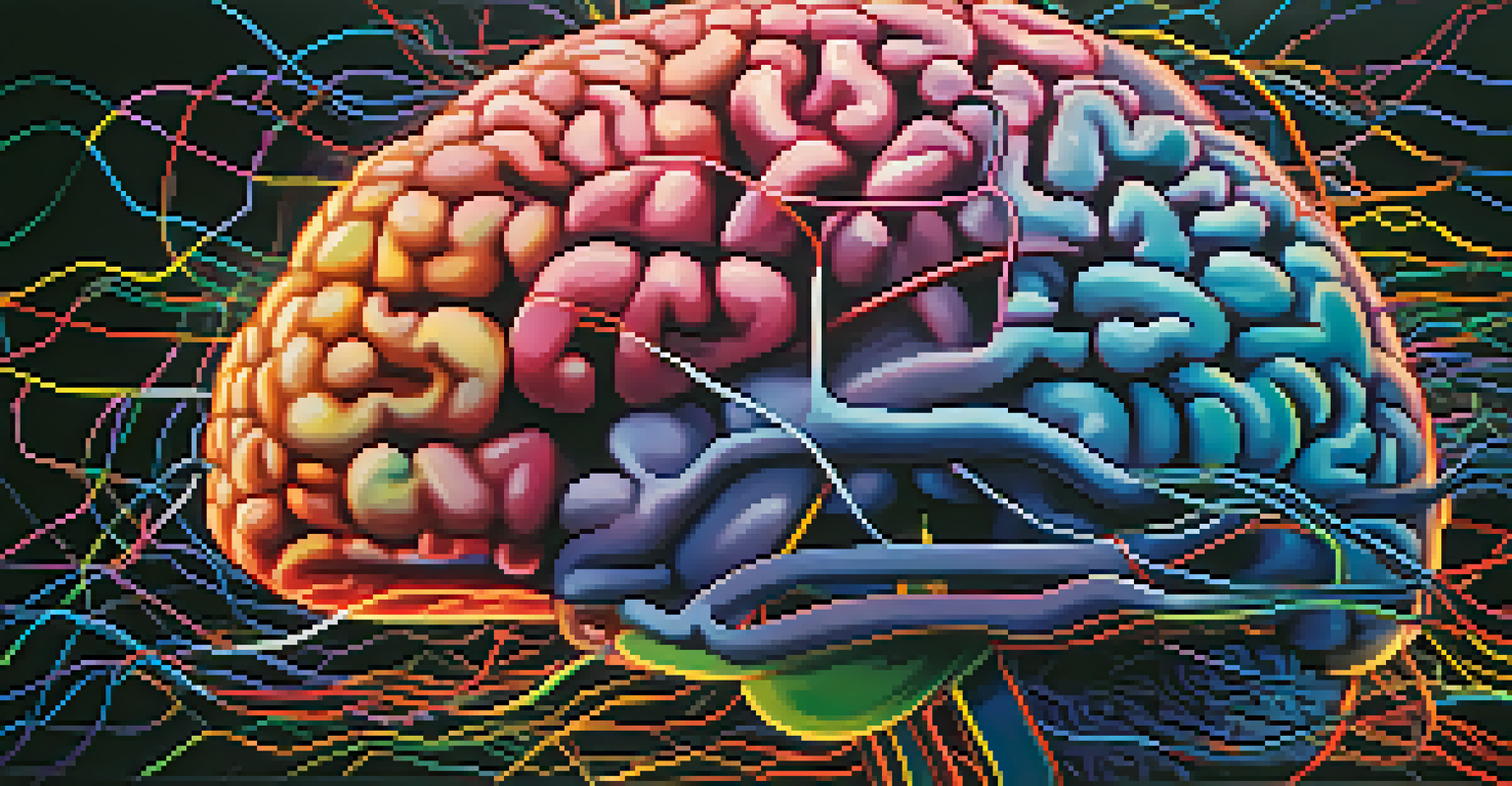Future Mental Health Solutions: The Hallucinogen Approach

Understanding Hallucinogens and Their Historical Context
Hallucinogens, substances that alter perception and cognition, have a storied past. Historically, they were used in various cultures for spiritual and healing purposes. This ancient usage is now being revisited, as modern science uncovers their potential therapeutic benefits for mental health disorders.
Psychedelics are not a panacea, but they have the potential to transform our understanding of mental health and offer new pathways for healing.
In recent years, researchers have started exploring these substances more rigorously. The interest in psychedelics like psilocybin and LSD has surged, with numerous studies showing promising results. This revival invites a broader discussion about their role in contemporary mental health treatment.
Understanding the historical context helps to demystify these substances. By recognizing their roots in traditional practices, we can better appreciate how they may offer new hope for individuals struggling with mental health challenges today.
The Science Behind Hallucinogens and Mental Health
At the core of the hallucinogen approach is a fascinating science that involves brain chemistry. These substances interact with serotonin receptors, which play a crucial role in mood regulation. This interaction can lead to profound alterations in perception, allowing individuals to explore their thoughts and emotions in new ways.

Research has shown that hallucinogens can promote neuroplasticity—the brain's ability to reorganize itself. This is particularly helpful for those dealing with conditions like depression, PTSD, and anxiety. By facilitating new neural connections, these substances can help individuals break free from negative thought patterns.
Hallucinogens: Historical Roots
Hallucinogens have a long history of use in spiritual and healing practices, which is now being revisited for their potential mental health benefits.
The science is still evolving, but the potential is clear. By harnessing the unique effects of hallucinogens, mental health professionals may be able to provide patients with effective tools for healing and self-discovery.
Recent Studies: Hallucinogens in Clinical Trials
Recent clinical trials have shed light on the efficacy of hallucinogens in treating various mental health conditions. For instance, studies using psilocybin for depression have shown significant improvements in patients' mood and outlook. These findings are encouraging, suggesting that hallucinogens could be a game-changer in mental health treatment.
The mind is like a parachute. It doesn’t work if it is not open.
Moreover, trials involving MDMA for PTSD have yielded remarkable results, with many participants reporting decreased symptoms after just a few sessions. Such outcomes signal a shift in how we view mental health therapies, moving towards more holistic and integrative approaches.
These studies not only highlight the potential benefits but also emphasize the importance of controlled environments and professional guidance. The combination of hallucinogens with psychotherapy is proving to be a powerful catalyst for healing.
Challenges and Stigma Surrounding Hallucinogen Use
Despite the promising research, challenges and stigma persist around the use of hallucinogens. Many people still associate these substances with recreational use and illegal activity, which can deter interest in their therapeutic potential. This stigma can hinder funding for research and the acceptance of these treatments in mainstream medicine.
Moreover, the legal status of hallucinogens varies widely across regions, complicating access to potential treatments. In some places, they remain classified as Schedule I substances, limiting research and therapeutic application. Addressing these legal and societal barriers is crucial for advancing the hallucinogen approach in mental health.
Therapeutic Potential in Trials
Recent clinical trials demonstrate promising results for hallucinogens, particularly psilocybin and MDMA, in treating conditions like depression and PTSD.
Changing perceptions will require education and advocacy. By sharing success stories and the science behind these treatments, we can slowly reshape the narrative around hallucinogens and open doors to new possibilities for those in need.
Integration of Hallucinogens in Therapy Sessions
The integration of hallucinogens into therapy sessions marks a transformative approach to mental health treatment. Therapists are beginning to incorporate these substances in a controlled setting, guiding patients through their experiences. This combination of substance and therapy can lead to profound insights and emotional breakthroughs.
In these sessions, the therapist acts as a facilitator, helping patients navigate their altered states of consciousness. This supportive environment allows individuals to confront deep-seated issues and emotions that may have been previously inaccessible. The therapeutic alliance plays a significant role in the effectiveness of this method.
Integrating hallucinogens into therapy is not a one-size-fits-all solution, but it offers a new avenue for healing. As practitioners gain experience and insight, the approach may evolve to suit diverse patient needs, creating a more personalized mental health care landscape.
The Future of Mental Health Treatment with Hallucinogens
Looking ahead, the future of mental health treatment with hallucinogens appears promising yet complex. As more research emerges, we may see an increased acceptance of these substances in therapeutic settings. Healthcare providers are likely to develop new protocols and guidelines to ensure safe and effective use.
Moreover, the potential for hallucinogens to address treatment-resistant conditions opens exciting possibilities. Patients who have struggled with traditional therapies may find relief through these innovative approaches, paving the way for a new era in mental health care.
Challenges and Future Outlook
Despite their potential, stigma and varying legal statuses pose challenges, but ongoing research may pave the way for broader acceptance in mental health care.
However, it is essential to proceed with caution and responsibility. Continued research, education, and open dialogue will be key in shaping the future landscape of mental health solutions involving hallucinogens.
Conclusion: Embracing a New Era in Mental Health Solutions
In conclusion, the hallucinogen approach represents a significant shift in how we view mental health treatment. By blending ancient practices with modern science, we can explore new avenues for healing and understanding. This emerging field invites us to challenge existing paradigms and consider the potential of these substances.
While challenges remain, the progress made so far is encouraging. As stigma diminishes and research expands, we may find ourselves at the forefront of a mental health revolution. Embracing these changes can lead to more effective, empathetic, and holistic care for those in need.

Ultimately, the journey toward integrating hallucinogens into mental health treatments reflects a broader commitment to exploration and innovation. By remaining open to new ideas, we can create a brighter future for mental health solutions.